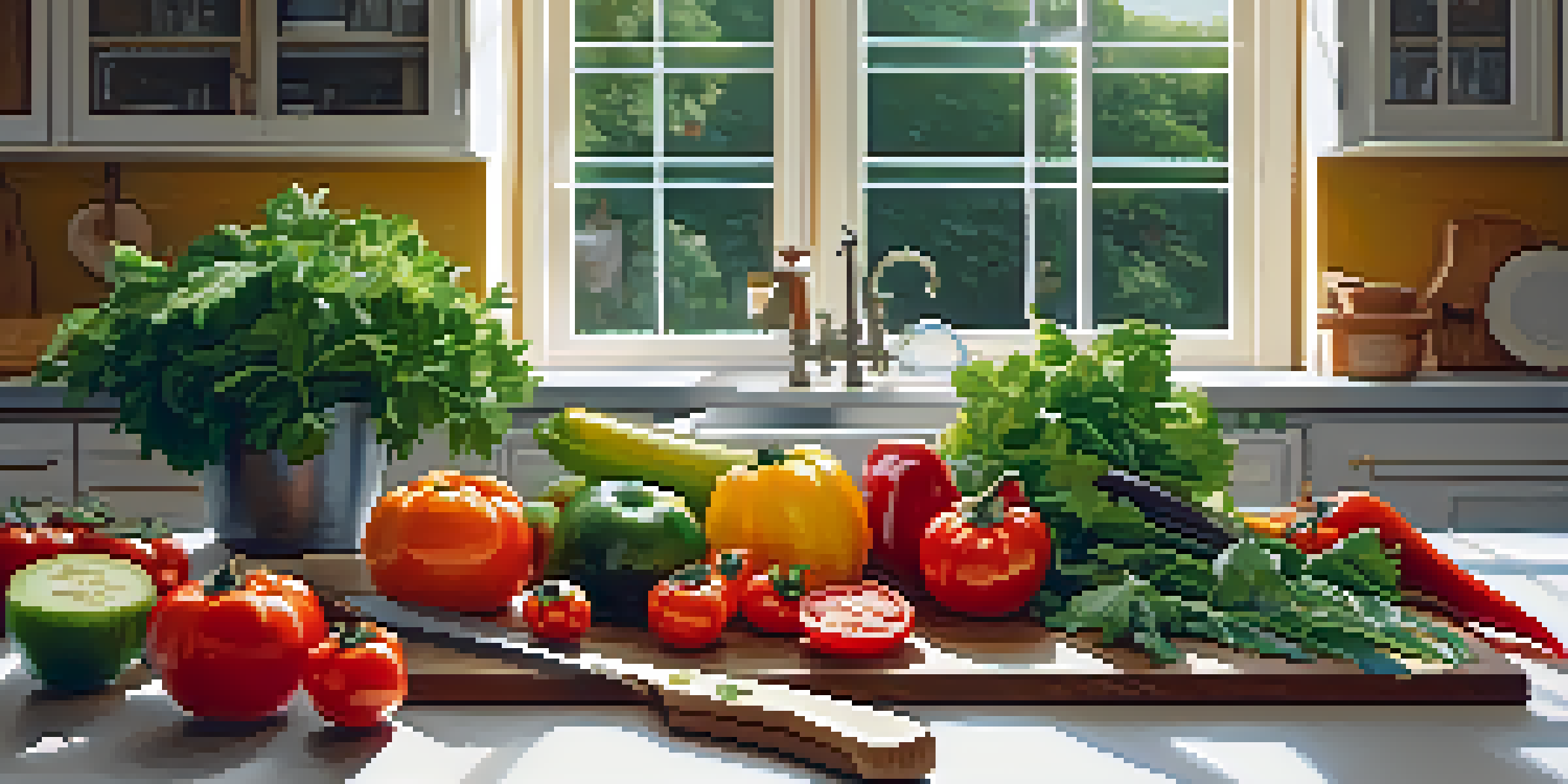Culinary Medicine: Bridging the Gap Between Cooking and Health

What is Culinary Medicine and Why It Matters
Culinary medicine is an innovative field that combines the art of cooking with the science of nutrition and health. It emphasizes the importance of food as medicine, encouraging individuals to make healthier choices in their daily meals. By understanding how various ingredients impact our bodies, we can bridge the gap between cooking and health.
Let food be thy medicine and medicine be thy food.
Imagine having a personal chef who not only prepares delicious meals but also understands the nutritional benefits of each ingredient. This approach empowers people to take control of their health through informed culinary choices. Culinary medicine is not just for chefs or healthcare professionals; it invites everyone to participate in their health journey.
By incorporating culinary medicine principles into everyday life, we can foster a healthier society. This field encourages a proactive approach to wellness, making it accessible and relatable for everyone, regardless of their cooking skills.
The Science Behind Culinary Medicine
At its core, culinary medicine relies on evidence-based research that highlights the connection between diet and health outcomes. Nutrition scientists study how specific nutrients affect our bodies, revealing the power of food in preventing and managing chronic diseases. For instance, understanding the anti-inflammatory properties of certain spices can help us make better meal choices.

This scientific foundation makes culinary medicine a valuable tool for both healthcare providers and individuals. It encourages a shift from treating illnesses to preventing them through dietary interventions. The more we learn about our food, the better equipped we are to use it as a form of preventive care.
By bridging culinary arts with medical knowledge, we can create meals that not only taste good but also nourish our bodies. This fusion of science and creativity invites everyone to explore the therapeutic benefits of cooking.
Culinary Skills for Healthier Living
Learning culinary skills is an essential part of culinary medicine. Being able to cook healthy meals at home can drastically improve one's diet and overall health. Simple techniques like meal prepping or understanding how to balance flavors can make healthy eating enjoyable and sustainable.
The doctor of the future will no longer treat the human frame with drugs, but rather will cure and prevent disease with nutrition.
Consider starting with basic cooking classes or following online tutorials. With practice, cooking will become second nature, and you'll feel more confident in your ability to create nutritious meals. Remember, cooking at home allows you to control the ingredients and portion sizes, which is crucial for maintaining a healthy lifestyle.
As you develop your culinary skills, you'll also discover new ingredients and flavors that elevate your meals. This exploration can lead to a more adventurous and satisfying dining experience, reinforcing the idea that healthy eating doesn't have to be boring.
The Role of Food in Disease Prevention
Food plays a vital role in preventing various diseases, from heart conditions to diabetes. A diet rich in whole foods, such as fruits, vegetables, whole grains, and lean proteins, can significantly reduce the risk of chronic illnesses. Understanding how specific foods can influence our health empowers us to make informed dietary choices.
For example, incorporating more antioxidants from berries or omega-3 fatty acids from fish can help combat inflammation and promote heart health. Culinary medicine encourages individuals to view food as a preventive tool rather than just fuel. This shift in mindset can create lasting changes in our health and well-being.
As we embrace this approach, we also cultivate a deeper appreciation for the food we eat. By making connections between what we consume and our health, we can create a culture of wellness that prioritizes nutrition in our daily lives.
Mindful Eating: A Key Component
Mindful eating is an essential aspect of culinary medicine, encouraging individuals to pay attention to the experience of eating. This practice involves savoring each bite, recognizing hunger cues, and being aware of the body's responses to food. By slowing down and truly engaging with our meals, we can foster a healthier relationship with food.
For instance, take a moment to appreciate the colors, textures, and flavors of your meal. Engaging all your senses can enhance your enjoyment and help you recognize when you're satisfied. This awareness can lead to healthier portion control and reduce the likelihood of overeating.
Incorporating mindfulness into your eating habits allows you to make conscious choices about what and how much you consume. This intentional approach aligns perfectly with the principles of culinary medicine, reinforcing the idea that food should be both nourishing and enjoyable.
Community and Culinary Medicine
Culinary medicine isn't just an individual journey; it thrives in community settings. Cooking classes, workshops, and group meal prep sessions create opportunities for people to learn and grow together. These communal experiences foster support, motivation, and the sharing of knowledge, making healthy cooking a fun and social event.
Consider joining a local cooking group or online community focused on healthy eating. Sharing recipes, tips, and experiences can inspire you and others to embrace culinary medicine. Moreover, cooking together can strengthen bonds and create lasting memories, all while prioritizing health.
By engaging in these community activities, we can create a culture that values health and wellness. Culinary medicine becomes a shared journey, encouraging everyone to explore the benefits of nutritious cooking together.
The Future of Culinary Medicine
As culinary medicine continues to gain recognition, its impact on healthcare and wellness is becoming more pronounced. Healthcare providers are increasingly incorporating dietary counseling into their practices, emphasizing the importance of nutrition in patient care. This shift indicates a growing acknowledgment of food's role in health management.
Furthermore, advancements in technology are making culinary education more accessible than ever. Online resources, apps, and virtual cooking classes allow individuals to learn at their own pace, breaking down barriers to healthy cooking. This democratization of knowledge supports a widespread understanding of culinary medicine.

Looking ahead, we can expect culinary medicine to play an even more significant role in public health initiatives. By equipping individuals with the knowledge and skills to make healthier choices, we can pave the way for a healthier future, one meal at a time.